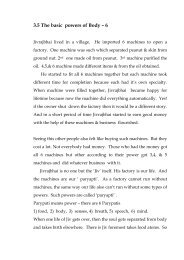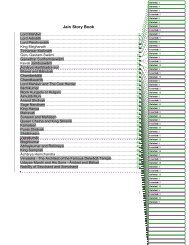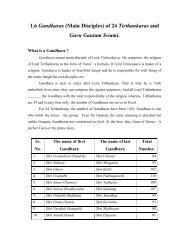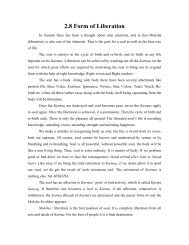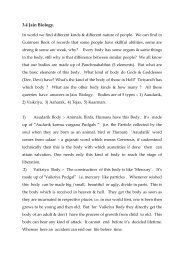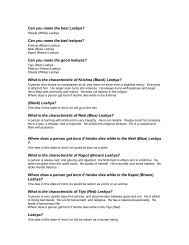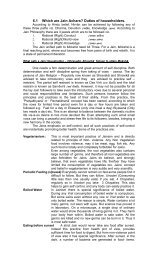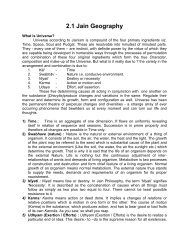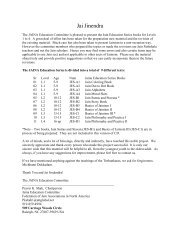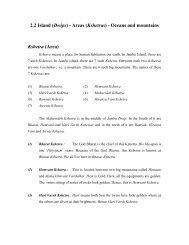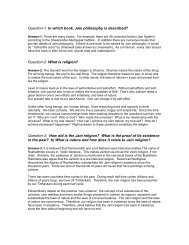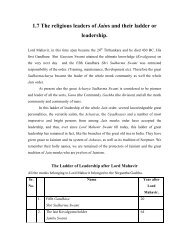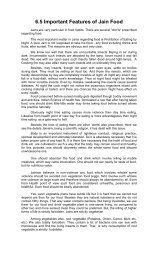Paryushan Parva - Jainism, Jain Religion - colleges
Paryushan Parva - Jainism, Jain Religion - colleges
Paryushan Parva - Jainism, Jain Religion - colleges
You also want an ePaper? Increase the reach of your titles
YUMPU automatically turns print PDFs into web optimized ePapers that Google loves.
Pratikraman in English with Meaning<br />
Going Back to the Path of Purification<br />
These living beings are indeed blessed.<br />
Oh! Great Tirthankars ! You dwell in Panch Mahavideha Kshetra, and I, a sinner, humble servant,<br />
virtue-less, am sitting here. Any sins pertaining to your knowledge, perception, conduct and<br />
austerity, whatever disrespect, ill-behavior, ill-worship or offense have been committed, then with<br />
folded hands, shunning pride, and bowed head, I repeatedly beg for your forgiveness. TASSA<br />
MICHCHHÄ MI DUKKADAM.<br />
Lesson 27 - Obeisance to Shri Siddhä Lords<br />
Second, I beg forgiveness from the infinite Siddhä Lords. I offer obeisance at every moment to the<br />
24 Tirthankars, who have become Siddhäs from Bharat Kshetra in this time cycle (Avasarpini Käl,<br />
regressive half cycle), and all other Siddhäs who have attained Moksha by eradicating all eight<br />
types of Karma.<br />
These Siddhäs are colorless, odorless, matterless, formless, imperishable, hunger-less, misery-less,<br />
disease-less, without sadness, birth-less, age-less, death-less, body-less, Karma-less, eternal and<br />
abode of unending bliss and happiness.<br />
You dwell in Siddhä Kshetra (that is at the top of the universe), in the state of liberation, and I, a<br />
sinner, humble servant, virtue-less, am sitting here! If I have indulged in any lapses pertaining to<br />
your knowledge, perception, character and austerities, or if have been instrumental of any<br />
disrespect, ill-behavior, ill-worship or offense, then with folded hands, shunning pride, and bowed<br />
head, I repeatedly beg for your forgiveness. TASSA MICHCHHÄ MI DUKKADAM.<br />
Lesson 28 - Obeisance to Shri Sädhu-Sädhvijis<br />
Third, I beg forgiveness from all Ganadhars, and past and present Ächäryas, Upädhyäys and<br />
Sädhu-Sädhvis. The Ganadhars possess 52 virtues, Ächäryas possess 36 virtues 33 , Upädhyäys<br />
possess 25 virtues 34 , and Sädhus possess 27 virtues 35 .<br />
We are truly indebted to our Ganadhars, Ächäryas, Upädhyäys and Sädhus who know the essence<br />
of the scriptures and are well-versed in them. They are on the path of salvation, and they guide<br />
others per the teachings of Tirthankars. They are like a wish-fulfilling gem, ornamental to the <strong>Jain</strong><br />
religion.<br />
They are followers of the 5 great vows of non-violence, truth, non-stealing, celibacy, and nonpossession.<br />
They practice 5 Samitis 36 that lay down ways and methods of carrying out essential<br />
33 See the Lesson 2 of Phase 1, meaning of Panchindiya Sutra<br />
34 Well-versed in 23 main Ägams (23 virtues), seventy qualities related to life-long conduct (one virtue), and seventy<br />
qualities related to the conduct that need to be exercised occasionally (one virtue). Thus Upädhyäyay has 25 virtues.<br />
35 Five great vows, no food at night, protection to six types of (all) living beings, ceasing of pleasures of five senses, no<br />
greed, forgiveness, purity of emotions, mind, speech and body , careful inspections of clothes, etc., to exercise restraint<br />
(samyam) all the time, tolerance to 22 types of adversities, and tolerance of inappropriate behavior of other living<br />
beings.<br />
36 Samiti means carefulness. There are five samitis: (1) To move about cautiously so as not to cause trouble to any living<br />
being is called iryä-samiti. (2) To speak what is true, beneficial, necessary and free from doubt is called bhäshä-samiti.<br />
(3) To act cautiously while procuring necessities such as food for the conduct of life-journey that they are free from any<br />
faults is called esanä-samiti. (4) To receive and place every thing after a proper inspection and cleansing of things like<br />
books, food-pots (pätra), and the like is called ädänanikshepa-samiti. (5) To dispose of things such as urine, stool,<br />
28




